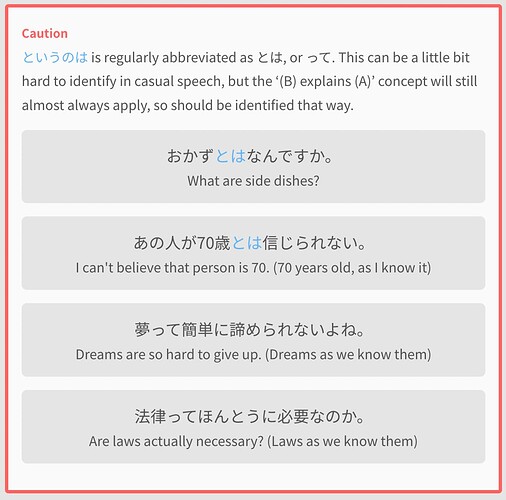There’s one for N1, (など)とは, but I’m pretty sure that’s different form the とは I often see in games, like this sentence I just saw in Final Fantasy.
“このドラゴン王国に人間とは珍しい”
Is this just a different way to say a grammar point that is already in Bunpro?
I don’t think so, that sentence was said by a dragon, so he’s not surprised at this information. The と seems like a quoting particle, unrelated to the grammar point linked. In other situations I’ve seen like “悪とは…”. I’m thinking とは in ff sentence is a shortened way of saying というのは
“In this dragon kingdom, humans are rare”
Assuming he is talking to a human, it sounds like the dragon is expressing surprise at seeing a human in this place to me
In this sentence I’m somewhat convinced that とは is giving off a “surprised” meaning like @Slysoft mentioned. However, you are right in that とは is a shortened way of saying というのは and this is actually in Bunpro. If you scroll down to the bottom of というのは - Japanese Grammar Explained | Bunpro you’ll find it touches on this.
However, actually going back to this sentence I’m not 100% sure anymore on if the “surprised” meaning is actually being conveyed or not. But all in all, とは is technically added to Bunpro since it’s touched on in the というのは grammar point. Whether or not “That which is a human in the dragon kingdom is rare”, where とは is nominalizing the phrase, also conveys surprise in this sentence, I’m not too sure.
Ye without context hard to say but I would second what was already answered and this being a contracted form of というのは as @josh has stated → in my eyes fits as “known as” here.
“このドラゴン王国に人間とは珍しい”
Lets have a look at the whole sentence.
As に in its most elemental sense always marks a destination, I would freely translate this as something like “That a human/humans (of all possible beings) would come to this very Dragon Kingdom…”
If you want to be more literal then the とは might be sth along the lines of “what people call a human / what is known as a human”
とは is for me just sth. used to put emphasis on a) “人間” and b) “このドラゴン王国”. この kinda puts emphasis on “this very kingdom” among all possible destination options and I see this working in combination with the とは as a way to contrast something not-so-often-seen (like a human) showing up here compared to just seeing dragons/dragon folk around.
Could be an observation that simply differs from the norm a lot, so while not “surprised”, he might be speaking to himself about that unusual sight while observing them. Or this might also be something the human or group of humans that just came to the kingdom hears/ are being adressed with. Lacking context here. But lets move on.
As dragons are often portrayed as being lofty and not considering humans (or really most other species) to be their equals in Japanese myths and tales, i could also perfectly imagine him looking down on a species such as humans and that he is just considering this a pasttime and is interested to see something that brings something “new” into his daily life.
For the dragon humans are probably puny existences or whatever, the とは (speculation) might also additionally serve as a way to speak not about this particular group but just the human species as a whole- so he is less looking at the individuals and more just matter of factly expressing slight surprise (or even anger depending on context) of humans stepping into his kingdom, which he might consider to be funny, offending, requiring lots of courage or whatever.
Anyways, I am not perfect at this either, so maybe I am wrong, but as I said at the start, I really think it is just used here due to the attitude of the dragon/his species towards humans in particular and the unusual sight of them there (for whatever reason, be it rules, far from their own kingdom, a well known tabu or whatever)
Sorry, if that ends up not fitting the bill
Thinking in terms of phrases it is:
- 〈このドラゴン王国に人間〉とは〈珍しい〉
- (Human(s) that come to this/the Dragon Kingdom )とは (are rare/curious).
So it comes down to how do we interpret AとはB
The surprise factor seems plausible. The は itself gives that feeling of specifically humans are rare as if maybe other beings are common.
The と gives off the quotation meaning in this context; and, the dual particle interpretation then is something like mentioned above
Another important thing to note is that there is not an explicit subject in this sentence so contextually there is room to interpret this sentence.
In all a transliteration would be:
- “Human beings (such as these) in the dragon kingdom are rare.”
A more natural translation would be something like:
- “Hmm, it’s curious to see humans in the dragon kingdom.” (Almost speaking to himself.)
My guess is this. Kinda goes along with the stylistic vibe too: “oh those things called humans, they’re rare here.”
We should probably all read the notes better 
My only example of dragons in Final Fantasy is from FFXIV, but I would say that this kind of speaking style is very common with them. Pretty much all the dragons in that game alone have almost “lofty” ways of speaking (and would be surprised to find a human in their domain considering the Dragonsong War). So whether this carries on to other FF games, I don’t know, but I would wager a guess that it does. The というのは meaning definitely seems to fit.
Yep, this is what it is. I often feel like とは or って can translate like ‘thingamajig’/‘thingos’/‘thingys’, and other similar words when abbreviated that way.
‘Those human thingys are rare around here’

